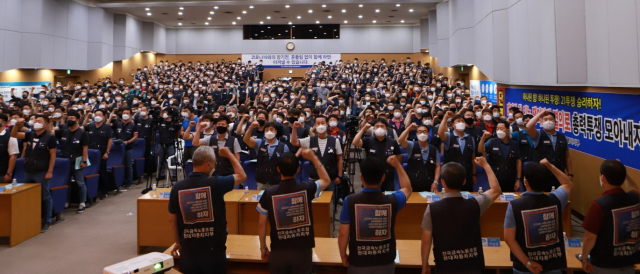 |
Hyundai Motor labor union members participate in a temporary delegate convention in Ulsan on Monday. (Hyundai Motor labor union) |
As South Korean automakers move to embrace the trend shift for eco-friendly vehicles, they face difficulties in narrowing differences with labor unions seeking wage increase and job protection.
The labor union of Hyundai Motor, the country’s leading automaker, said it is set to vote to strike Wednesday, after failing to reduce the gap in this year’s collective bargaining negotiations.
In the 13th round of negotiations held this year, Hyundai Motor management suggested a proposal that includes a raise of 50,000 won ($44.20) of basic pay, a one-off bonus amounting to 100 percent of monthly salary and an additional 3 million won, an encouragement allowance of 2 million won and 100,000 won in gift certificates.
The labor union, however, rejected the proposal and demanded the company raise basic pay by 99,000 won, a bonus that amounts to 30 percent of the company’s net profit and to extend the retirement age to 64. They also asked to guarantee job security, as the company expands its manufacturing capabilities for electric vehicles.
“In the 13 rounds of negotiations, we have failed to narrow differences with the company management. We announce a rupture in the negotiation and plan to stand for our labor right to go on a strike,” Hyundai’s labor union said in a statement.
“Last year, when other conglomerates and public companies were raising wages and offering ample bonuses to encourage their workers, we had agreed to the collective bargaining agreement without a conflict,”
“But we could not erase the feeling that Hyundai Motor’s management is ignoring our reasonable demand, and distorting distributive justice to treat us as servants,” the union said.
Hyundai’s labor union is the country’s biggest such group. While known for its hard-line stance, the unionized workers have not gone on strike in the past two years, as they acknowledged the company’s struggle to deal with the impacts of the COVID-19 pandemic.
“We have made a decision to offer a wage raise that is the highest amount in the past three years, and a bonus that is also more than what we have agreed to last year,” Hyundai Motor President Ha Eon-tae said.
“Please make a rational and wise decision so that the negotiation does not go in the direction of a fight, but in a way where we can prepare for future survival.”
GM Korea, the local subsidiary of the Detroit-based carmaker General Motors, which recently resumed operation of its manufacturing plants after being hit by the global semiconductor shortage, is also struggling, as its labor union decided on a strike Monday.
In a ballot held from Thursday to Monday, GM Korea’s unionized workers voted to strike. According to the union, 76.5 percent of 6,613 unionized workers voted for the strike. The labor union has 7,635 members.
By Jo He-rim (
herim@heraldcorp.com)








